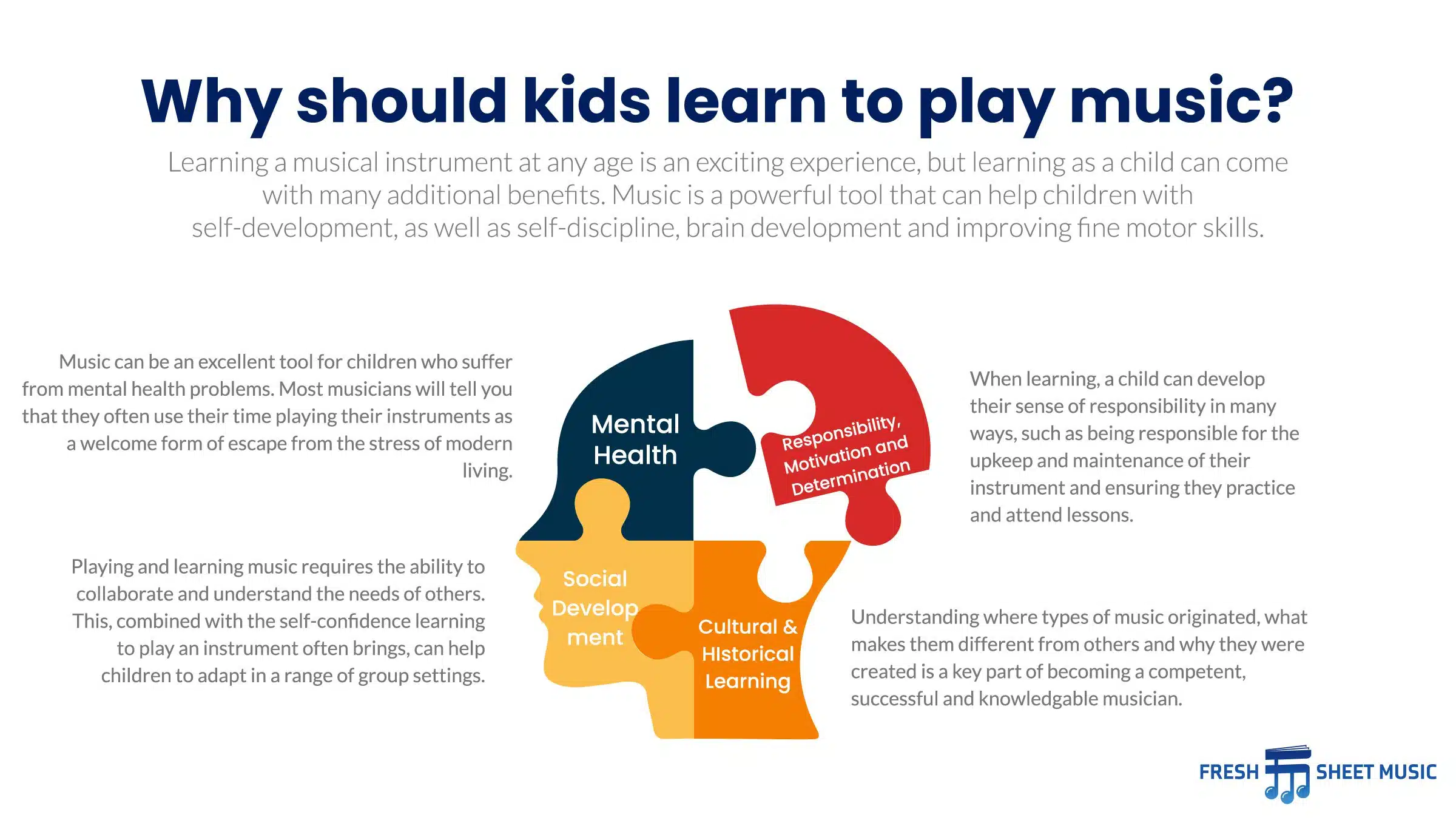Learning a musical instrument at any age is an exciting experience, but learning as a child can come with many additional benefits. Music is a powerful tool that can help children with self-development, as well as self-discipline, brain development and improving fine motor skills.
This article will explore why learning to play music can be a life-changing skill for a child and help them succeed in many areas throughout their life.
Brain health and development
It is no secret that music can help with brain development at all ages. Studies have even shown that being able to play a musical instrument can help to prevent dementia in later life. Learning to play an instrument at a young age comes with a host of benefits in terms of brain development and brain health, and research suggests that children who learn to play music generally score higher in standardised tests.
There are many reasons why music is so great for brain health and development in children. Playing a musical instrument requires you to use parts of your brain that are rarely used in day-to-day life and to use several parts of the brain together. This means that children can develop their maths skills, co-ordination, fine motor skills and short/long term memory all at once when they are learning and playing. Music is very mathematical and helps children to recognise patterns and rhythms as they progress as musicians. Regardless of the musical instrument that a child learns, using your brain to coordinate your finger movement (and sometimes breathing) whilst recognising complex rhythmic patterns to develop muscle memory is all part of learning to play.
Reading sheet music is a skill that can help children to quickly recognise patterns. Some people compare learning to read music notes to learning another language, which is also something that can help children to excel in many other areas of their lives. A project by the University of California found that children who learned to play music used many skills that translated into other areas. Leader of the study, Professor Gordon Shaw, stated that when children learn music, they learn a lot about fractions and ratios and also proportions.

Mental health
Mental health is a topic that has been gaining traction in the news in recent years. With many people suffering from mental health problems, finding solutions and coping mechanisms that can help those with anxiety and depression is invaluable. Childhood can be a tough time for many children and can promote feelings of anxiety, worthlessness and issues with self-confidence and self-esteem. It is important to recognise that mental health in children is equally as valuable as in adults, if not more so.
Music can be an excellent tool for children who suffer from mental health problems. Most musicians will tell you that they often use their time playing their instruments as a welcome form of escape from the stress of modern living. Music can be a healthy vice and also help children to express themselves, their personalities and their emotions. This, in turn, can lead to a better relationship with their thoughts, feelings and emotions.
The focus required to play a musical instrument can be akin to a sort of meditation, which can help children to relax and relieve stress. Playing music can also have a positive impact on a child’s self-confidence and self-esteem. Learning to play and to read sheet music requires children to overcome hurdles and take on constant challenges which can result in a huge sense of achievement.
Responsibility, motivation and determination
Many adults fail to learn how to play musical instruments due to the level of motivation and determination that is required. To successfully learn to read sheet music and to play an instrument to a high standard requires substantial perseverance, emotional regulation and levels of responsibility. When learning, a child can develop their sense of responsibility in many ways, such as being responsible for the upkeep and maintenance of their instrument and ensuring they practice and attend lessons. Responsibility, motivation and determination are life skills that remain of equal importance throughout one’s life.
Social development
Succeeding socially as a child can be very difficult and comes with many challenges. Music is often learned or played in a group setting or with at least one other person. Learning to work alongside others and understand the importance of teamwork in creating music is a skill that can be transferrable to other aspects of a child’s social development. Playing and learning music requires the ability to collaborate and understand the needs of others. This, combined with the self-confidence learning to play an instrument often brings, can help children to adapt in a range of group settings.

Cultural and historical learning
Children that learn to read music notes will naturally be exposed to different cultures and the history that surrounds them. There are countless styles of music that have derived from all around the globe, so those who learn music theory will have a greater understanding of the world around them. Understanding where types of music originated, what makes them different from others and why they were created is a key part of becoming a competent, successful and knowledgable musician.

